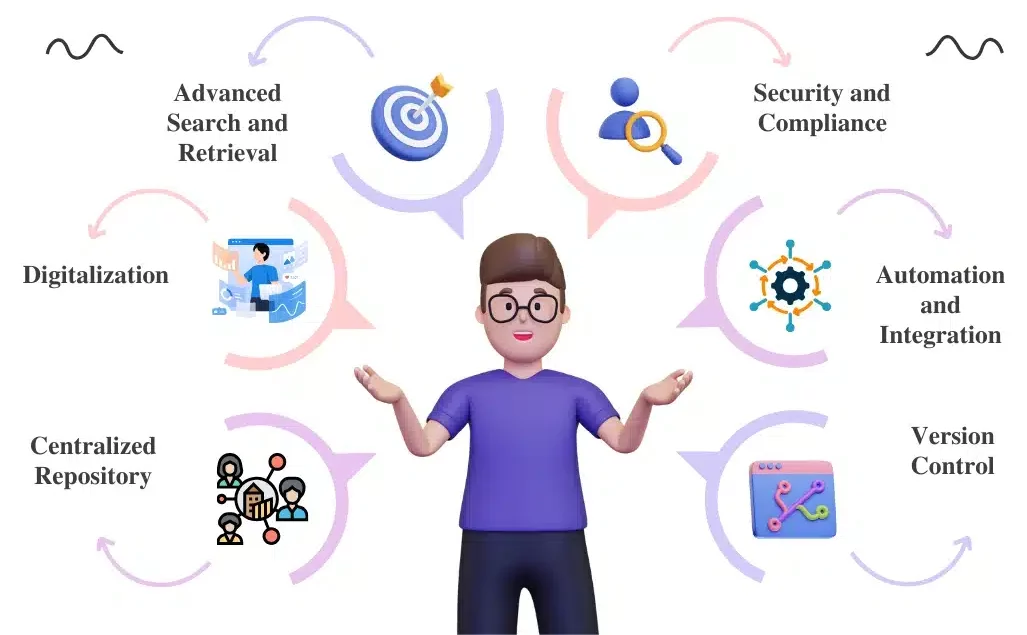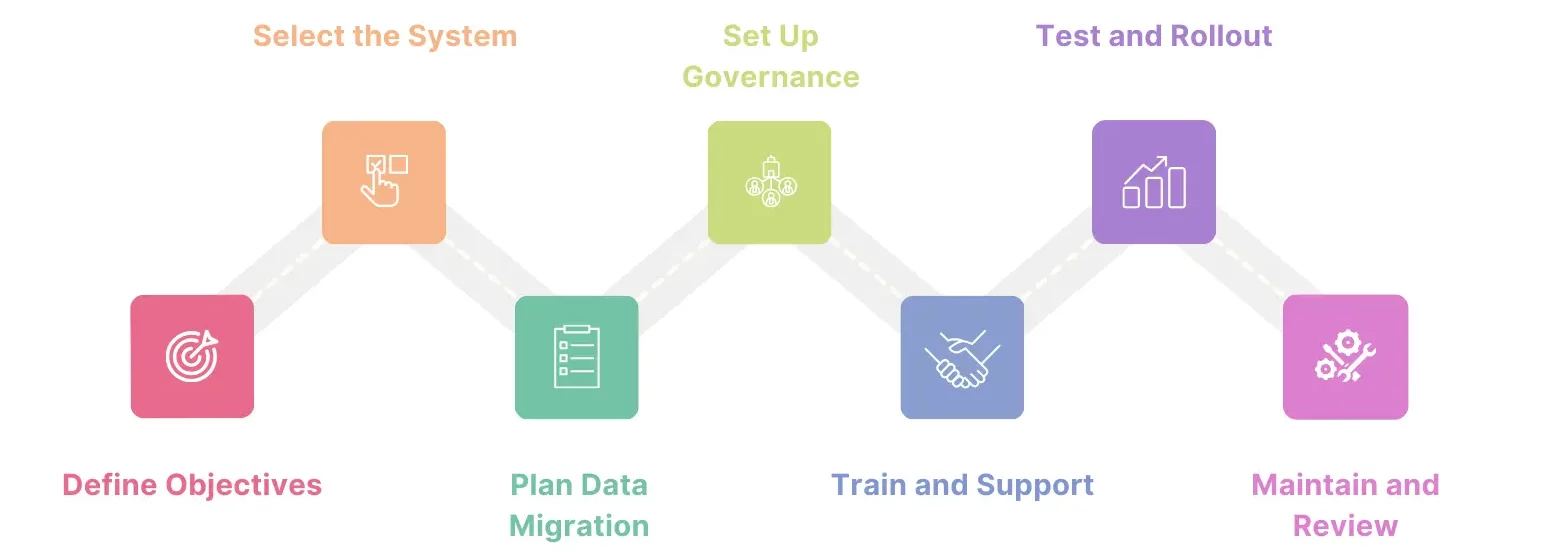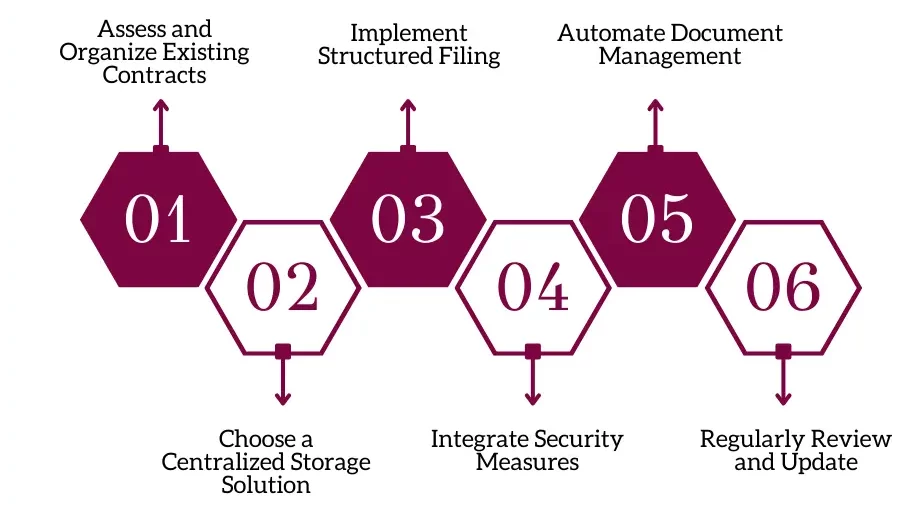What Is Contract Storage?
Contract storage is a way of keeping legal agreements safe and organized, so they’re easy to find. You can store them in paper files or, more often, in digital systems or the cloud. Good contract storage helps businesses keep track of their contracts, make updates, and quickly find documents when needed.
Why is it important?
- Compliance: Ensures businesses meet regulatory and legal obligations by securely storing contracts and key terms.
- Risk Mitigation: Helps avoid missed deadlines, obligations, or potential disputes by organizing and tracking contractual terms.
- Efficiency: Streamlined storage reduces the time and effort required to manage, retrieve, or audit contracts, saving resources.
- Data Security: Protects sensitive information from unauthorized access, especially through digital storage solutions with encryption.
- Global Accessibility: A cloud-based storage system allows for global storage. This provides access to contracts from anywhere, supporting remote work and global operations.
Understanding the Basics of Contract Storage
Contract storage means keeping your digital agreements safe and organized so they’re easy to find and access. It keeps all your contracts in one secure location.
A good contract storage system is essential for managing contracts well. It automatically tracks important dates and ensures you meet deadlines. This helps prevent issues like losing documents or making mistakes..
The Importance of Efficient Contract Storage
Efficient contract storage is crucial for effective contract management. Here’s why:
- Quick Access: Quick access makes it easy to find contracts quickly. This saves time and speeds up decision-making.
- Enhanced Security: It protects sensitive data by using strong access controls and encryption. This helps ensure compliance and reduce risks.
- Better Organization: It keeps contracts organized, reducing clutter and mistakes.
- Increased Efficiency: Automates routine tasks and alerts, boosting productivity and reducing administrative burden.
- Cost Savings: Reduces labor costs and avoids penalties from missed deadlines or compliance issues.
- Scalability: Adapts to growing contract volumes and evolving business needs.
Why Contract Storage is Needed in 2024?
- Increased Compliance Demands: Rules are getting more complicated. Secure and organized contract storage helps avoid legal penalties by keeping everything in order.
- Risk Mitigation: Proper storage tracks obligations, deadlines, and renewals. This reduces the chance of missing terms, disputes, or financial losses.
- Data Security: With more cyber threats, digital contract storage protects contracts using encryption and secure access controls.
- Remote Work Accessibility: With more people working remotely, centralized digital storage makes it easy for teams in different locations to access contracts.
- Efficiency and Automation: Modern storage systems offer automation features like renewal reminders and keyword searches, saving time and improving contract management.
You might want to read: What is Contract Management Software?
Key Features of a Contract Storage System
Choosing the right contract storage system depends on your business needs and how complex your contracts are. Here are some important features to look for:
- Security: Your system should keep your data safe and private. Look for features like encryption, access controls, and audit trails.
- Accessibility: You need easy access to your contracts. A cloud-based system lets you access them from anywhere, helping everyone work together.
- Scalability: Pick a system that can grow with your business. It should handle more contracts as you expand without slowing down.
- Data Extraction and Analysis: Use tools that pull out key data and create reports to help with decision-making.
How Businesses Can Improve Their Contract Storage System

To improve your contract storage system, focus on making it easier to access, more secure, and more efficient. Here are some simple strategies to help:
Centralized Repository
- Single Source of Truth: Keep all your contract data in one central place. This way, nothing gets lost, and all information stays the same and accurate.
- Central Hub: Manage and access contracts from one spot, and connect it to tools like Google Drive or Microsoft Word to make working with documents easier.
- Optical Character Recognition (OCR): Use OCR to turn scanned paper documents into editable and searchable text, making it simpler to work with contracts.
- Digital Repositories: Store contracts digitally instead of using physical files. This saves space and makes it much easier to find and access contracts.
Digitalization
- Transformation of Processes: Digitalization involves converting traditional, paper-based processes into digital formats, enhancing efficiency and accessibility. This shift allows businesses to streamline operations and reduce manual tasks.
- Data Integration and Analysis: It enables the integration of data across various platforms, allowing for better analysis and decision-making. Businesses can leverage real-time insights to improve performance and respond quickly to changes.
Advanced Search and Retrieval
- Keyword Search: Use advanced search tools with keywords and contract details to quickly find documents.
- Data Extraction: Employ AI to automatically find and organize key contract information.
Security and Compliance
- Sensitive Data Protection: Protect contract information with encryption and access controls.
- Compliance Risks: Regularly check and update storage practices to meet legal and industry standards.
Automation and Integration
- Workflow Automation: Link with contract management software to automate storing, retrieving, and managing contracts.
- Software Integration: Make sure it works well with other tools to simplify operations.
Version Control
- Track Changes: Keep track of updates and changes to ensure you always have the latest version.
- Audit Trails: Use audit trails to monitor changes and access to contract documents.
Preparing for Contract Storage Implementation

- Define Objectives: Determine what you need from the system (e.g., security, easy access). Think about what problems you want to solve and what features are most important for your team.
- Select the System: Research and choose a system that fits your needs and integrates with existing tools. Compare different options to find one that matches your requirements and works well with your current software.
- Plan Data Migration: Assess current data, develop a migration plan, and back up everything before transferring. Make sure you know what data you have, how to move it safely, and that you have copies in case something goes wrong.
- Set Up Governance: Define user access controls and ensure the system complies with legal requirements. Decide who can access the system and what they can do, and make sure the system follows all relevant laws and regulations.
- Train and Support: Train users on the new system and provide ongoing support. Make sure everyone knows how to use the system and has help available if they run into problems.
- Test and Rollout: Conduct pilot testing, gather feedback, and then roll out the system gradually. Start with a small group to test the system, collect their input, and then slowly introduce it to the rest of the team.
- Maintain and Review: Keep the system updated, review processes regularly, and measure its effectiveness. Regularly check that the system is running well, make improvements as needed, and see if it’s meeting your goals.
Identifying the Right Contract Storage Solution
Knowing what you need from a contract storage system is important before you look at available options. Think about things like the size of your business, how many contracts you manage, and how much money you have. Cloud-based solutions are becoming popular because they are easy to access, can grow with you, and save money. They localize the need for on-premise servers and complex IT setups, making them a good choice.
Check out the features different providers offer. Look for things like automated workflows, e-signatures, and how well they work with other business tools like CRM and ERP systems.
These features help manage contracts better and make your work more efficient. While features matter, do not forget the user experience. Pick a system that is easy to use and understand. This will make it simpler for your team to adjust.
A Beginner’s Guide to Setting Up Your Contract Storage System
Identify Needs: Figure out what you need in a system, like security, search tools, and ease of use. Think about how many people will use the system and what features they’ll need.
Choose a System: Look at different options and pick one that fits your needs and works well with your current tools. Check if the system can grow with your business in the future.
Organize Contracts: Sort your contracts into clear categories and use keywords or tags to make searching easier. Make sure to group contracts by urgency or priority for quick access when needed.
Set Security: Use access controls to decide who can view or edit contracts, and encrypt sensitive information to keep it safe. Set up regular security checks to ensure everything stays secure.
Automate Tasks: Create reminders for key contract dates and automate simple tasks to save time. Use automation to flag any contract that needs immediate attention or renewal.
Train Your Team: Make sure everyone knows how to use the system and follow the rules you’ve set up. Offer ongoing training whenever the system gets updated or new features are added.
Review Regularly: Check the system from time to time to keep it organized and working well. Feedback should be gathered from users to see if any improvements can be made.
You might want to read: What is an E-Signature?
Step-by-Step Guide to Streamlining Your Contract Storage

1. Review and Organize Contracts
- List Contracts: Make a list of all current contracts and sort them by type, date, and importance.
- Remove Duplicates: Get rid of duplicate or outdated contracts to keep things simple.
2. Choose a Central Storage System
- Pick a System: Select a digital storage system or contract management tool that keeps contracts secure and easy to find.
- Check Compatibility: Make sure the system works with other tools your organization uses, like CRM or document management systems.
3. Set Up an Organized Filing System
- Create a Structure: Group contracts into folders by department, type, or date.
- Use Standard Names: Develop consistent naming rules to make contracts easy to identify.
4. Ensure Security
- Control Access: Set user permissions so only authorized people can view or edit contracts.
- Add Encryption: Use encryption to protect sensitive contract data from unauthorized access.
5. Automate Management
- Set Alerts: Schedule automatic reminders for important contract dates like renewals or expirations.
- Speed Up Search: Use search tools to quickly find and access contracts.
6. Regularly Review and Update
- Do Audits: Regularly check the contract system to ensure it’s organized and up-to-date.
- Update as Needed: Adjust storage methods or tools to meet changing business or legal requirements.
Benefits of Effective Contract Storage
- Efficiency: Streamlines access to contracts, reducing time spent searching for documents and improving overall workflow.
- Security: Protects sensitive information from unauthorized access and ensures data integrity.
- Compliance: Helps in adhering to legal and regulatory requirements by maintaining proper records and documentation.
- Risk Management: Reduces the risk of missing important deadlines or obligations by providing timely alerts and reminders.
- Cost Savings: Reduces costs associated with physical storage and management by transitioning to digital solutions.
Conclusion
Efficient contract storage is key to managing contracts well. A central, secure system makes processes smoother, enhances security, and helps meet regulations. Features like encryption and automatic alerts further strengthen the system.
To set up your storage, start by digitizing contracts with OCR technology and setting up secure access controls. Regular audits and reports are also crucial for keeping data safe. By following these steps and using the right tools, businesses can effectively manage their contracts.
FAQs
How can OCR technology improve contract storage?
OCR technology makes storing contracts and finding data much faster and easier. It can change scanned papers into text that you can edit. This greatly helps with managing contracts more accurately and saves money.
How does centralized contract storage enhance contract management?
Centralized contract storage consolidates all contracts into one secure location, making it easier to access, manage, and track them. This reduces the risk of misplaced documents, improves organization, and streamlines contract retrieval.
What are the security benefits of using a digital contract storage system?
Digital contract storage systems offer enhanced security features such as encryption, access controls, and secure backup options. These measures protect sensitive information from unauthorized access and potential breaches, ensuring compliance and safeguarding data.
How can automated alerts in a contract storage system help prevent missed deadlines?
Automated alerts and reminders notify users of important dates, such as contract renewals or expirations. This proactive approach helps prevent missed deadlines, ensures timely renewals, and avoids potential penalties or disruptions in business operations.
How does version control in a digital contract storage system improve contract management?
Version control in a digital contract storage system allows users to track changes made to contracts over time, ensuring that the most up-to-date version is always accessible. This reduces the risk of errors from using outdated documents, enhances collaboration between teams, and provides a clear audit trail of revisions, improving overall contract transparency and accountability.





